Are minimum EPC requirements due to change soon?
Rishi Sunak’s government is planning to delay energy efficiency targets for landlords so as not to “overburden” them with energy efficiency costs. Although energy efficiency measures result in decreased energy bills, the upfront costs can be expensive. Struggling householders, Tory ministers claim, are the reason they are delaying or abandoning green policies ahead of the next election. New EPC requirements for rented properties are expected to be pushed back beyond the proposed date of 2025. The prime minister claimed he does not want to “hassle” voters, and that reaching the UK’s net zero carbon emissions target must be achieved in a “proportionate” way. Housing secretary Michael Gove told the Sunday Telegraph that his department was “asking too much too quickly” of landlords, and called for a “relax” of the pace. According to the Financial Times, “The Conservatives accuse Labour of being overzealous on environmental issues and not paying due attention to the concerns of hard-pressed households.” A government source told Sky News last week that EPCs “need fundamental reform.” This issue raises several questions: if landlords won’t be required to improve homes yet, do private tenants have to continue suffering soaring energy bills? Are EPCs still fit for purpose?
High energy bills are due in part to the overall efficiency of a home’s heating source, electricity source, and insulation levels. In 2022, gov.uk reported that the average landlord in the UK makes £16k a year from their private tenants. Government statistics published on July 13th found that, on average, it costs £7430 to improve rented dwellings rated D or below to band C. This figure is reflected in our own findings and history of installs. In 2021, the government’s English Private Landlord Survey found that most landlords own more than one property. Most landlords are retired. Although generally, landlords are in a better financial position than private tenants, there are serious costs involved in upgrading multiple properties. There is no doubt that some landlords will need support.
NRLA
Ben Beadle, chief executive of the National Residential Landlords Association or NRLA, says there needs to be a detailed plan in place with a fair financial package to support improvements in the private rented sector. Landlords have known for years of government plans to require rented homes to be at a C, but they have been left in limbo unable to plan for a specific date. At the start of July, Ben Beadle met with Michael Gove to discuss the projected minimum EPC guidelines. He expressed that the cost of paying upfront for upgrades in an area with lower property value and lower rent would overwhelm many landlords. He said regarding his meeting with Gove: “To support landlords in areas of low property values, we have asked for some kind of tapering to any cap that’s introduced to reflect that”.
Gove “reassured” the NRLA that the government “is aware there is an impact on landlords caused by the delays to the announcement, and understands the need for clarity – reiterating that there will be movement on the consultation response before Christmas.” The NRLA lay out what they want from the government like this:
- “A definitive timetable for publication of the consultation response and necessary legislation and how it will align with work by the Department for Levelling Up Housing and Community (DHCLG) on developing a decent homes standard for the sector.
- A move to take into account energy improvement works already carried out by landlords when it comes to implementing the price cap.”
Walmsley also specifies that the cap would be “tapering” based on property values, in recognition that energy efficiency measures are much more affordable to some landlords than others.
What is the minimum EPC for a rented property?
Current MEES (Minimum Level of Energy Efficiency) standards require the minimum EPC for renting to be at an E. This was projected to change to C in April 2025 for newly rented properties. It would have applied for all rented properties from 2028. There is a cost cap in place to protect landlords at the moment if they cannot afford to get to E easily:
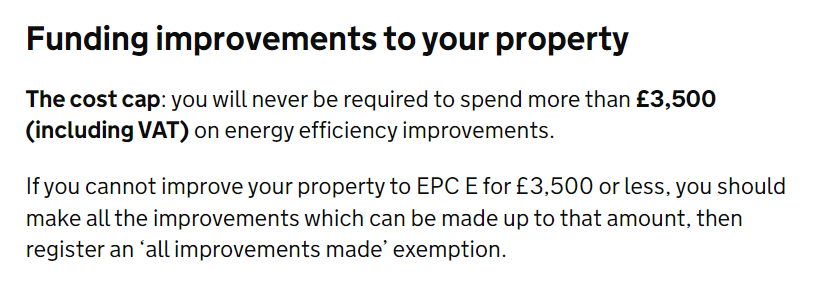
Alternatively, landlord’s can look into government and local authority funding if their tenants are eligible:
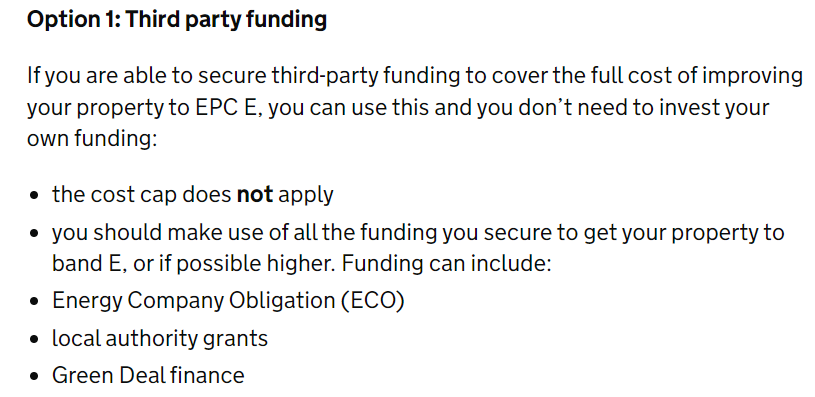
Anyone in a rented home rated E, F, or G and in receipt of the following benefits can access ECO4 funding for energy efficient home upgrades:
Child Benefit
Housing Benefit
Income Based JSA
Income Related ESA
Income Support
Pension Credit Guarantee
Pension Savings Credit
Tax Credits
Universal Credit
Anyone in a rented home rated E, F, or G in a local authority district partaking in ECO Flex can access the same funded home improvements as long as:
There is a combined household income of £31,000 or below
Someone in the property has a serious illness exacerbated by the cold
There is further qualifying criteria for ECO Flex, please read our blog post to learn more!
How to improve an EPC rating
Surprisingly, the easiest and cheapest way to reach the minimum EPC for renting and beyond is:
Loft insulation
If a loft has no insulation at all to begin with, increasing this to 270mm can significantly boost your rating.
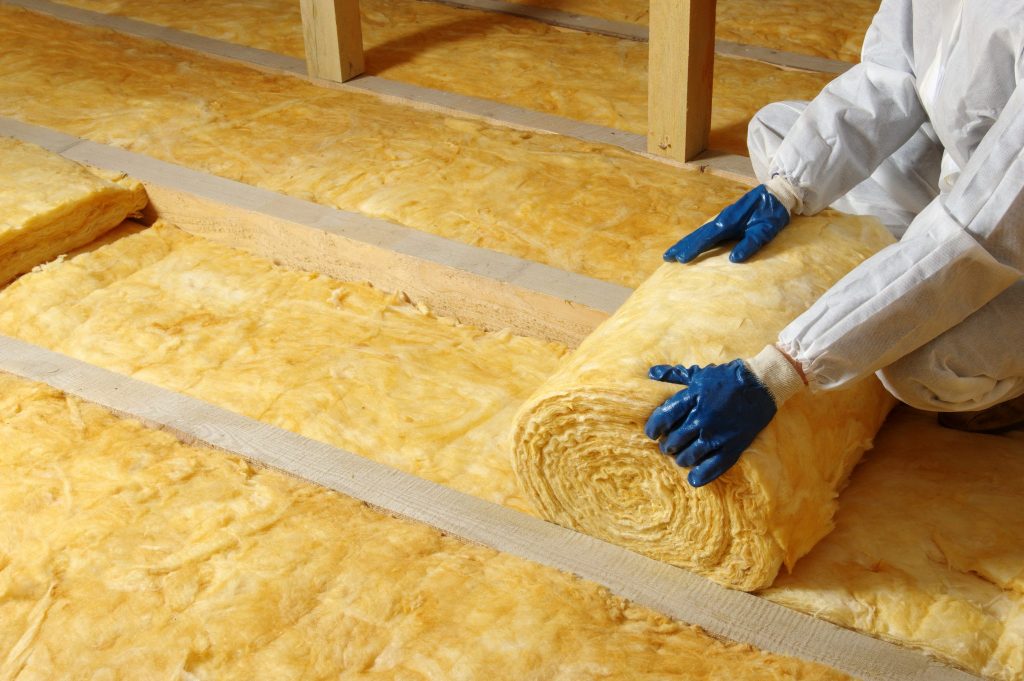
Loft insulation works for up to 40 years. It is cheap to install, and you can do it yourself if you have no concerns over damp in the loft. If you have more questions about this install, read our blog post all about loft insulation here! The next cheapest and easiest ways to improve your EPC are:
Thermostatic radiator valves and smart thermostats
If you do not have heating controls in your property you cannot easily manage how your heating system is working and how much it is costing to run. TRVs, or smart TRVs, should be installed so you can control the heating in a room.
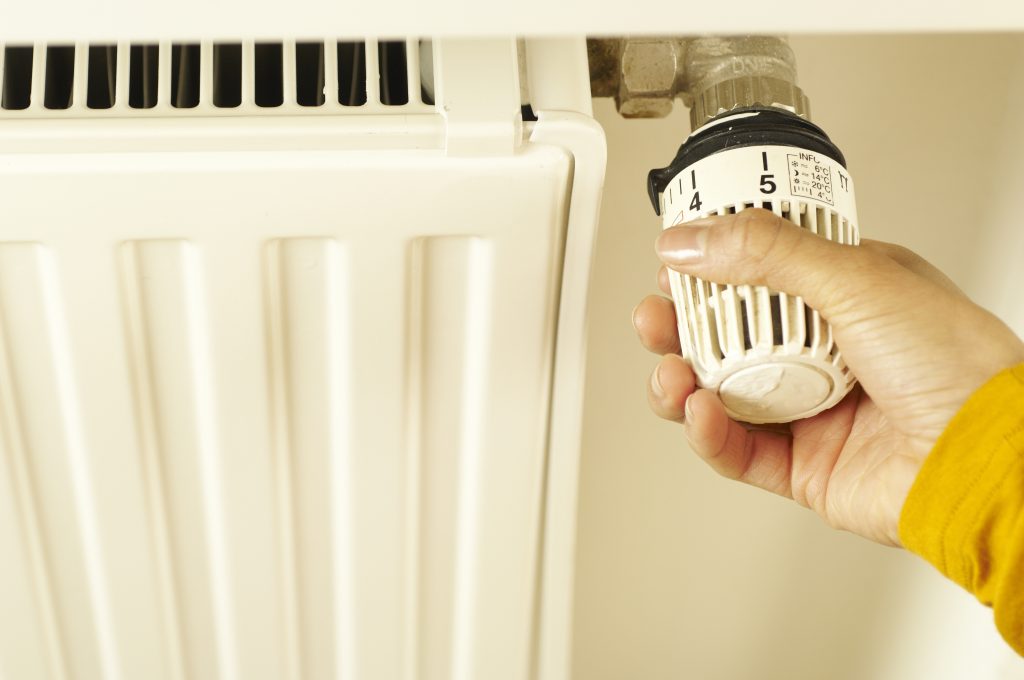
Smart thermostats clearly display the temperature, heating usage, and often heating costs.
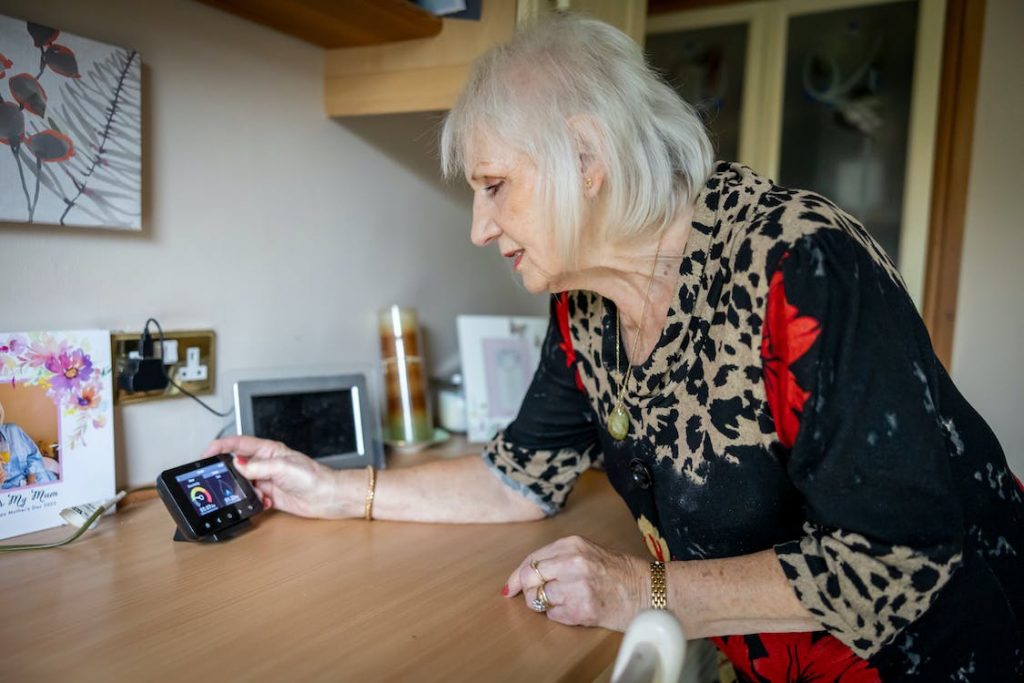
Smart thermostats give you a clear picture of changes you need to make. They also let you do this when you aren’t even at home! They can tailor your heating system to your routine.
Of course, the biggest contributors to a good EPC rating are the most expensive. Solar panels or condensing gas boilers are currently the best way to ensure your EPC is C or above.
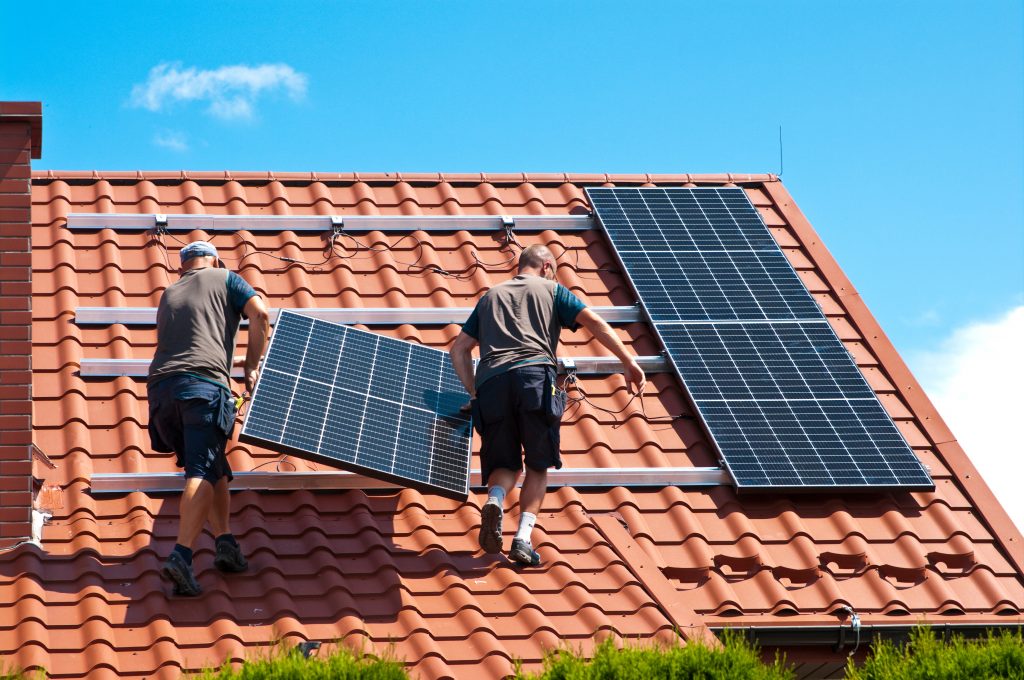
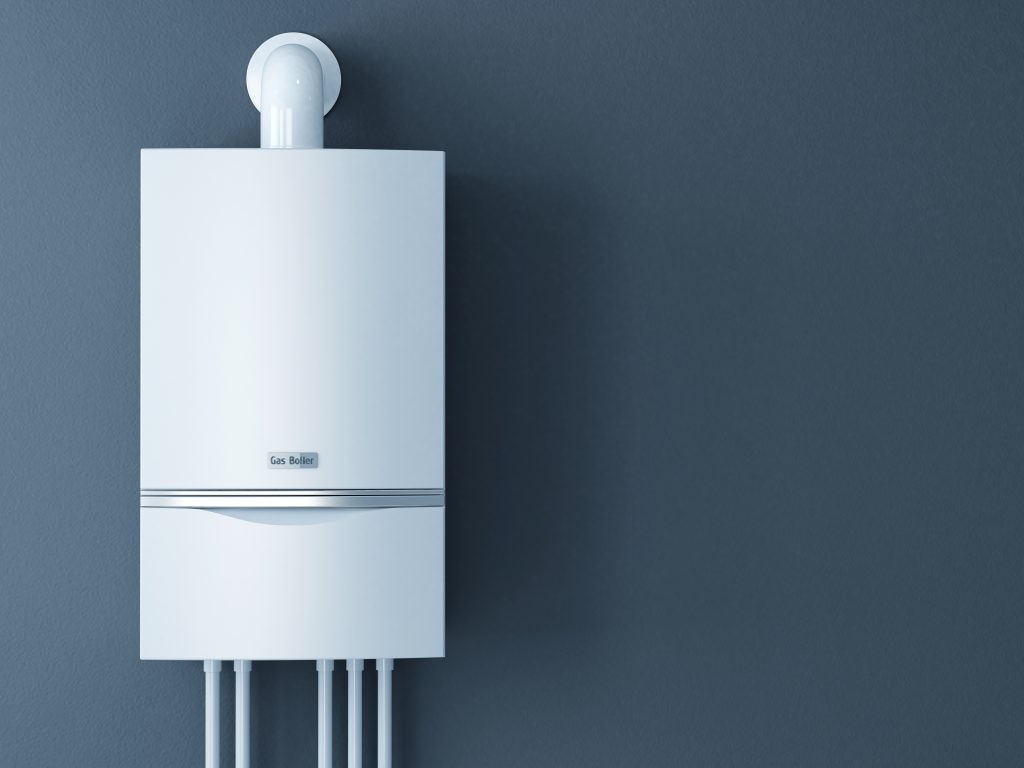
The Eco Experts claim that installing a condensing gas boiler can improve your EPC by up to 40 points. Many of our installs have taken an E rated home to a C rated home just through improving an old boiler to a condensing boiler and adding loft insulation, so hopefully it won’t be as bleak or expensive to reach a C as landlords may think.
Are Energy Performance Certificates outdated?
If EPCs are no longer fit for purpose but we do not have an updated system, then this leaves householders and landlords in a confusing position. However, it is unlikely the current assessments will be overhauled completely. In 2022, politician Jacob Rees Mogg apparently called EPCs “worthless”. A paper published by the Royal Institute of Chartered Surveyors later that year was not quite as extreme but instead called for a “modernisation of the scheme.” They noted the importance of EPCs reflecting “final energy use” of a given home as this can change depending on the occupants’ patterns and needs. The RICS think EPCs should assess different elements of energy efficiency in homes separately for a “comprehensive evaluation of building performance.” The RICS also recommend the EPC system should be fully digitised. All calculations and results would be accessible via a digital platform, making it easier for customers and landlords to understand suitable energy efficiency improvements. They suggest that the government “campaign to inform the general public about the value of EPCs and how to use them correctly. The current rise in energy prices and the increase in extreme weather events caused by climate change provide a big opportunity to raise awareness about the condition of the UK building stock and establish a clear link between building performance, energy cost, and carbon emissions.”
For the time being, it seems as though the most pressing issue is high energy bills rather than EPC ratings. The two are no doubt linked but if you are worried about upgrading your property due to EPC ratings changing, your main focus should be on if the home upgrade will reduce the energy bills of the house. EPC ratings are still the standard across the UK. Due to Rishi Sunak’s comments last week, it does not seem as though private rented properties will have to reach a C without some level of support or forewarning.
